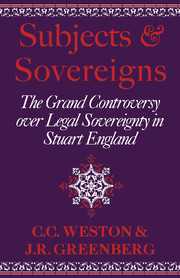Book contents
- Frontmatter
- Contents
- Dedication
- Preface
- 1 The shift in political thought
- 2 The keeper of the kingdom
- 3 The new age of political definition
- 4 That ‘Poisonous Tenet’ of co-ordination
- 5 The curious case of William Prynne
- 6 The idiom of restoration politics
- 7 Co-ordination and coevality in exclusion literature
- 8 The law-makers and the dispensing power
- Appendix: Co-ordination and resistance at the Revolution
- Notes
- Bibliography
- Index
7 - Co-ordination and coevality in exclusion literature
Published online by Cambridge University Press: 08 October 2009
- Frontmatter
- Contents
- Dedication
- Preface
- 1 The shift in political thought
- 2 The keeper of the kingdom
- 3 The new age of political definition
- 4 That ‘Poisonous Tenet’ of co-ordination
- 5 The curious case of William Prynne
- 6 The idiom of restoration politics
- 7 Co-ordination and coevality in exclusion literature
- 8 The law-makers and the dispensing power
- Appendix: Co-ordination and resistance at the Revolution
- Notes
- Bibliography
- Index
Summary
The whig attempt to bar the duke of York from the throne combined with the lapse of censorship in 1679 to let loose a veritable flood of tracts, their number and variety unmatched since the civil war. Running through exclusion literature were the civil-war ideologies so noticeable earlier in the century. New tracts were written on the lines charted by Herle and Hunton; and although the Fuller Answer was not reprinted, the co-ordination principle was patently in the mainstream of political thought. Hunton's Treatise of Monarchie appeared in new editions, in 1679 and 1680, and the Answer to the Nineteen Propositions continued to work its old magic. It became readily available once more with the publication of Charles I's collected works in two editions (1662 and 1687), and the Political Catechism, based squarely on the Answer, was reprinted in 1679. That tract was frequently noticed in contemporary literature; and as late as March, 1683, copies were discovered at the Crown and Angel tavern that Titus Oates and his friends frequented. Equally to the point was the republication in 1679 and again in 1685 of the Parker society's papers on the antiquity of parliament, that work providing an intellectual mainstay for an immemorial house of commons.
Anti-co-ordination forces were just as zealous. Heylyn's Stumbling-block of Disobedience was reprinted in the clergyman's collected writings, this time with a subtitle drawn from the body of the work.
- Type
- Chapter
- Information
- Subjects and SovereignsThe Grand Controversy over Legal Sovereignty in Stuart England, pp. 182 - 221Publisher: Cambridge University PressPrint publication year: 1981



